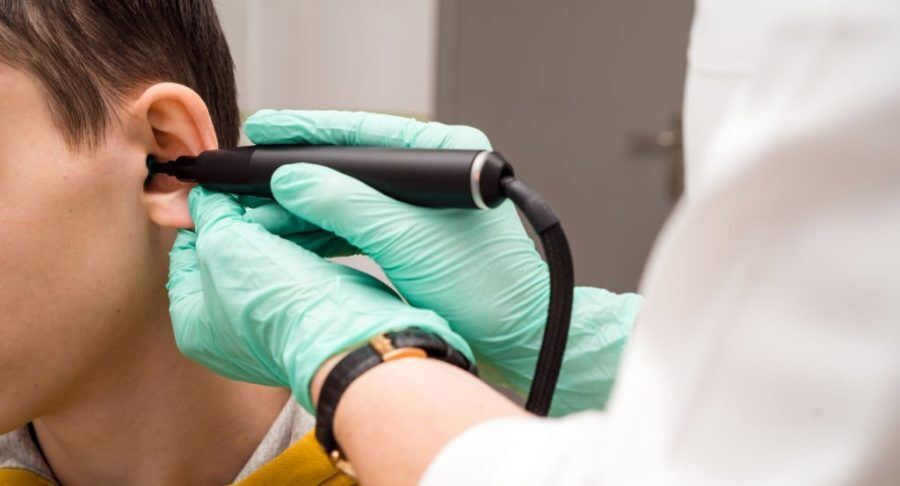Deafness
- Home
- Deafness

Hearing loss can be caused by many different causes, some of which can be successfully treated with medicine or surgery, depending on the disease process.
Three Types of Hearing Loss
- Conductive hearing loss – when hearing loss is due to problems with the ear canal, ear drum, or middle ear and its little bones (the malleus, incus, and stapes).
- Sensorineural hearing loss (SNHL) – when hearing loss is due to problems of the inner ear, also known as nerve-related hearing loss.
- Mixed hearing loss – refers to a combination of conductive and sensorineural hearing loss. This means that there may be damage in the outer or middle ear and in the inner ear (cochlea) or auditory nerve.
Conductive Hearing Loss
Causes :
- Malformation of outer ear, ear canal, or middle ear structures
- Fluid in the middle ear from colds
- Ear infection (otitis media – an infection of the middle ear in which an accumulation of fluid may interfere with the movement of the eardrum and ossicles
- Allergies
- Poor Eustachian tube function
- Perforated eardrum
- Benign tumors
- Impacted earwax
- Infection in the ear canal
- Foreign body in the ear
- Otosclerosis
Sensorineural Hearing Loss
Causes :
- Exposure to loud noise
- Head trauma
- Virus or disease
- Autoimmune inner ear disease
- Hearing loss that runs in the family
- Aging (presbycusis)
- Malformation of the inner ear
- Meniere’s Disease
- Otosclerosis – a hereditary disorder in which a bony growth forms around a small bone in the middle ear, preventing it from vibrating when stimulated by sound.
- Tumors
If you have hearing problems, help is available. Treatment depends on the cause and severity of your hearing loss.
Options include:
- Removing wax blockage. Earwax blockage is a reversible cause of hearing loss. Your doctor may remove earwax by loosening it with oil and then flushing, scooping or suctioning out the softened wax.
- Surgical procedures.Surgery may be necessary if you’ve had a traumatic ear injury or repeated infections that require the insertion of small tubes that help the ears drain.
- Hearing aids. If your hearing loss is due to damage to your inner ear, a hearing aid can help by making sounds stronger and easier for you to hear. An audiologist can discuss with you the potential benefits of using a hearing aid, recommend a device and fit you with it. Hearing aids are small electronic devices worn in your ear that make sounds louder and clearer, although they won’t give you back your full hearing.
- There are many different types of hearing aid, including:
- behind the ear hearing aids (the most common type) – hearing aids that go around the top and back of the ear
- in the ear hearing aids – small hearing aids that fit in the opening of the ear
- in the canal hearing aids – very small hearing aids that fit a bit further into the opening of the ear, so they’re just visible
- Cochlear implants. If you have severe hearing loss, a cochlear implant may be an option for you. Unlike a hearing aid that amplifies sound and directs it into your ear canal, a cochlear implant compensates for damaged or nonworking parts of your inner ear. If you’re considering a cochlear implant, your audiologist, along with a medical doctor who specializes in disorders of the ears, nose and throat (ENT), can discuss the risks and benefits with you.
Benefits of treatment
Getting treatment can improve your quality of life dramatically and this shreeji ENT hospital can treat ear nose and throat as well as orthopaedic patients from thaltej, vastrapur, bodakdev, naranpura, ghatlodiya, gota, chandlodiya, shilaj, judjes Bunglows road, Memnagar, Gopalnagar area. As per Dr. Tejal Shah in shreeji ent hospital at Gurukul Road, Ahmedabad, People who use hearing aids report these benefits:
- Greater self-confidence
- Closer relationships with loved ones
- Improved outlook on life, overall
- Less depression
